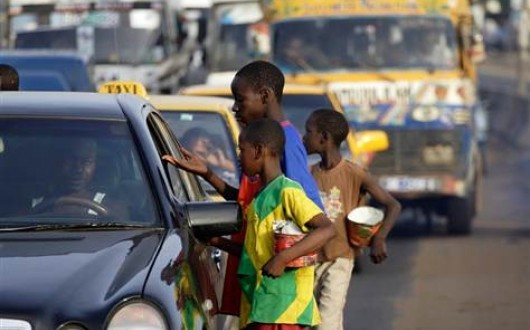Child Streetism And Its Implications On Security
- Home
- Child Streetism And Its Implications On Security

Child Streetism And Its Implications On Security
 In 2010, Ghana was able to achieve the Millennium Development Goals (MDGs) even before its deadline in 2015.
In 2010, Ghana was able to achieve the Millennium Development Goals (MDGs) even before its deadline in 2015.
There has been an improvement in social intervention programmes such as the Livelihood Employment Against Poverty (LEAP), National Health Insurance Scheme (NHIS), MASLOG and many others which aims at eradicating poverty, unemployment and improving on standards of citizens.
Urban Streetism
However there is still a problem of the rising numbers of street children in the urban areas especially teenage girls.
This clearly shows that educating the girl child in the long term will eradicate child neglect as well as minimize crime.
Dr James Kwegyir-Aggrey once said “if you educate a woman you educate a family (nation) but when you educate a man you educate an individual”.
Role of Government
The eighties and nineties saw a growing global concern for the rights and welfare of children, bringing about the adoption of the Convention on the Rights of the Child by the General Assembly of the United Nations on 20 November 1989.
This was followed by the adoption of the Organisation of African Unity’s Charter on the Rights and Welfare of the Child by the Assembly of Heads of State and Government held in Addis Ababa in1990.
The Children’s Act 560 of 1998 also defines a child to be anyone below 18 years old.
It Provides rights of children, maintenance and adoption, check child labour and apprenticeship and above all seek the best
Interest of the child.
The Ministry of Gender, Children and Social Protection has developed a comprehensive action to curb streetism in the country under the project “the reintegration of street children”. The Department of Social Welfare under the Ministry of Gender, Children and Social Protection has been mandated by the 1998 Children Act 560 to investigate cases of contravention of children right.
Moreover, the government of Ghana has put many measures in place to stop and reverse the situation.
A clear example is expressed through its legislative acts, agencies and policies. For instance, Article 28(1) of 1992 Ghanaian Constitution spells out the conditions under which the Ghanaian child should and should not be raised.
In view of this, the government of Ghana and non-governmental Organisations have committed many resources into halting and reversing the phenomenon, but the number of children on the streets keep escalating at an overwhelming rate.
Streetism is the manifestation of child neglect. Street pregnant adolescents continue to end up with complications, which increase maternal morbidity and mortality in Ghana which is a threat to security.
What is child streetism?
Child Streetism refers to the situation in which children find refuge and their means of survival on streets. They survive by engaging in menial income generating activities such as selling water, begging and as head porters.
Some also engage in commercial sex. And they often sleep in public places such as public washrooms, bus stops, in front of shops and video centers during the night.
The only support network for street children are other people on the streets.
Security is human rights, free from fear, and every nation wants peace and security for development, hence it becomes worrying when the nation is faced with the problem of child streetism which has made them to be a highly vulnerable group and is a security threat to the nation halting development.
Causes of Streetism
This trend is caused by changes in the family dynamics that make the child to be unhappy at home, peer pressure, and also the attraction of living luxurious life style they see around which their parent or guardian cannot afford to give to them.
Therefore, they prefer the street than home. Also, Parental negligence and poverty are major causes of streetism, which affect their education.
Thus making illiteracy rate to be high in Ghana leading to insecurity.
Any solutions?
Orientation and training should be given to parents and families, on how to treat their children with warmth and affection so that their children do not escape from home.
On the other hand, people should be encouraged and be motivated to become foster parents to a needy child.
The governmental and non-governmental organizations should help parents of streets children to be economically independent to prevent the children from escaping from home.
Psychologists need to provide life skill training, particularly to street children so that they can go back home and lead their normal lives like other children who are already home.
On the other hand, Metropolitan, Municipal and District Assemblies should enact bye-laws that will educate parents and the guardians about the parental and adult responsibility towards children.
Street teenagers should be made aware that early delivery will not end poverty, but will rather lead to criminal activities such as kidnapping, child prostitution and armed robbery.
There must be a strong extended family and the traditional welfare system to help children attain their goals in life.
Most at times, both the street mothers and fathers are teenagers, the fathers abandon their babies to the teen mothers without maintenance.
Due to this, the poverty cycle continues and because there is no supervision and monitory of the teen babies, they also grow to become street children, which worsen the social exclusion in the society.
Research shows that since the late 1980s, crimes committed by young people were a great concern due to the increasingly violent and uncontrolled behaviors.
They don’t even value themselves as most of them think that the society has rejected them, hence their negative actions.
Conclusion
In conclusion, as street teen babies continue to grow, illiteracy, disease and unemployment and crimes will increase and lead to under development of the nation.
Therefore, as a nation, if we do not adhere to what Dr. James Kwegyir-Aggrey said with women having low educational background, marginalized and equality and equity of feminism are not achieved to move the nation forward, then child streetism will never end inspite of measures put in place.
The nation has no future if child streetism is not curbed.
By Doris Dzifa Dordoye, Department of Social Welfare
Source: GNA
- Share
Classic Ghana
Classic Ghana brings you into a fun world of arts, entertainment, fashion, beauty, photography, culture and all things in between. Let’s explore these together!







